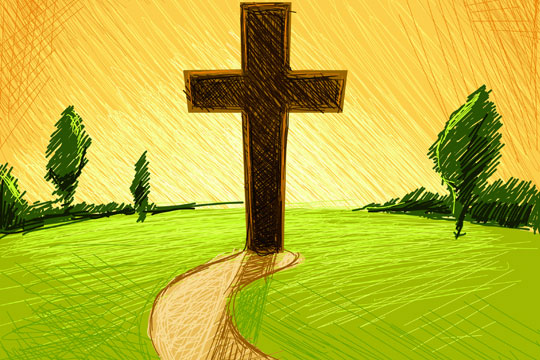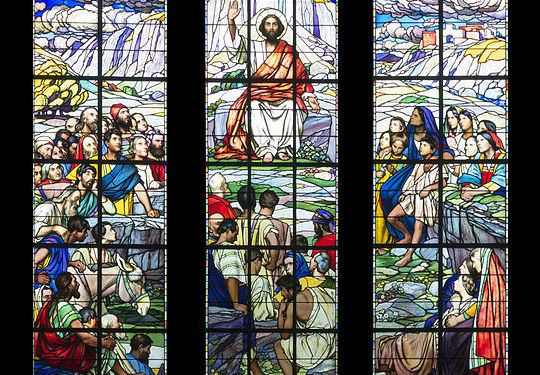
Last time I wrote, I shared my plan for a class on Jesus as a child in the Temple, mission, and the Examen. This was not my most successful class. Attendance was lower than usual, which seemed like it might make for a quieter session, but the young people were full of questions that derailed the planned lesson. I firmly believe that young people should be given the opportunity to ask their questions, so I opened the floor for a time. I can’t recall exactly the first question that got the ball rolling, but I know the subject of an upcoming parish blood drive came up. It seemed a good time to talk a bit about the gift of sharing life in this way. Other questions about science and religion required me to clarify that the Catholic religion is not opposed to science, despite a persistent myth that it is.
When I tried to bring the conversation back to the planned topics of the night, the flow wasn’t ideal, but we did have some discussion on finding our mission for life. Trying to call the young people to pray on this particular night was a challenge. Unfortunately, more than a few of the students couldn’t keep themselves quiet and thus disturbed those who wanted to enter into prayer. The Examen, therefore, was not warmly welcomed that night.
But prayer takes practice. I don’t know when I might return to the Examen with this particular group, but I will continue practicing different forms of prayer with the young people. Next week, for instance, as we begin Lent, I’ll likely use Joe Paprocki’s guided reflection on the three pillars of Lent—prayer, fasting, and almsgiving.
When prayer doesn’t go as planned, what tactics do you have for not letting it derail the experience for the rest of the group? How do you maintain a prayerful setting for your classes in the face of obstacles?





Ha! sounds a bit like my foray last week into meditative prayer. Some would not shut their eyes, and it took a lot to get some of them to stop disturbing one another. I had to move some of them away from one another. They need practice.
Joyce, yes, practice is necessary, but moving positions is a simple step that can help a great deal.
I agree, Denise, teaching the youth to develop a prayer life/routine takes practice! Two things that have helped my 6th Grade class as we study Salvation History: occasional trips up to the Church Sanctuary for recited prayer and silent prayer; and setting up a prayer space/table in our classroom. For silent prayer in the Church, I have the youth spread out so that they are not as easily distracted by others. I sometimes give them a sheet of suggested prayers which focus on our lesson for that night. We usually keep it short – 4-5 minutes before we return to the classroom. During Lent, we will recite the Stations of the Cross in the Church; I found a version of it much more suited for youth and each student takes a turn as the “Station Leader”.
The prayer table consists of a colored cloth to match the Liturgical season, a Crucifix and a large Bible standing up, with some flowers laid near the Cross. I find that having the youth stand up and gather around that prayer table helps them enter into a more prayerful posture and spirit.
Mary, it sounds like you have a prayerful environment and thoughtful plans in place for making the most of your church visits.
So true that prayer is a skill that we must teach kids and we can’t give up when they don’t “get it” right away. Here are a couple of things that I’ve done in the past, when kids don’t cooperate with a prayerful experience:
1. I remind them that we are here to deepen our relationship with Jesus and that I take my relationship with Jesus seriously and I want them to do the same. I explain that it pains me to see some of them acting as though they are not interested in a relationship with Jesus.
2. I tell them that we can try this again next week or we can just read from the book the whole time…what’s you choice? They want to do something different so they ask for prayer but I tell them that in order for that to work, they will have to step up with their behavior.
Thanks for sharing your struggle, Denise. I’m sure I speak for many fellow catechists when I say, “we can relate!”
I think you’ve shared that first strategy here before, Joe, and I did try to use it, but some nights we just have to chalk up to learning and try fresh again the next time.
I’ve been trying to figure out how to encourage my kids to focus during prayer time as well, but they are younger, first grade. Some of them are pretty focused, but there are a number who aren’t paying attention, talking to each other, etc. I’m not really sure how to draw them in. We do go over to the church every few weeks and they like that, but even there, there are a couple who are distracting to the others.
Also, each week we all say something we are thankful for and something we are praying for. This year I’m getting alot of I’m fhankful for hockey and x box az well as a couple kids who are just looking for the silliest thing they can think of. I don’t mind being thankful for toys, I certainly love my computer, but I’d like to again, encourage them to go a little deeper and be a little more serious. But saying be quiet, talk to God doesn’t seem to be the best way to go about that. 🙂
So any ideas?
Karen, that’s a tough one because sometimes kids really are grateful for things like hockey or xbox and they just haven’t really learned how to go a little deeper. Other times, as you said, they really are trying to be silly. It can be hard to distinguish. One way may be to ask them to name a person they are thankful for to get away from objects, possessions, and things.
I don’t have much experience with first graders, but as Joe suggested, maybe more specific directions for the prayers of thanks would help. In addition to naming people, maybe at different times you could focus the gratitude on other things, such as best moment of that day, favorite thing learned about in class, interesting thing they saw in church, etc. Playing reflective background music might also help the tone of prayer time.